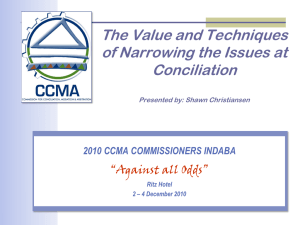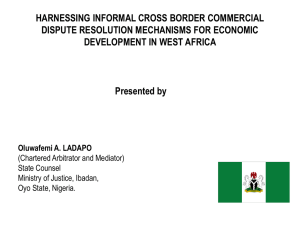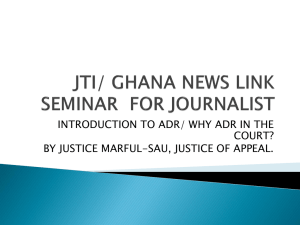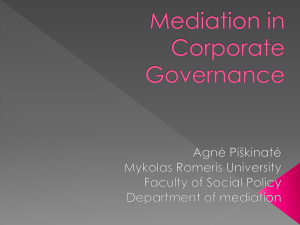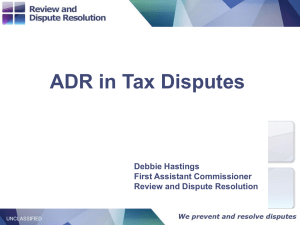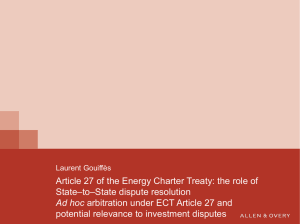Understanding Dispute Resolution Options in the
advertisement
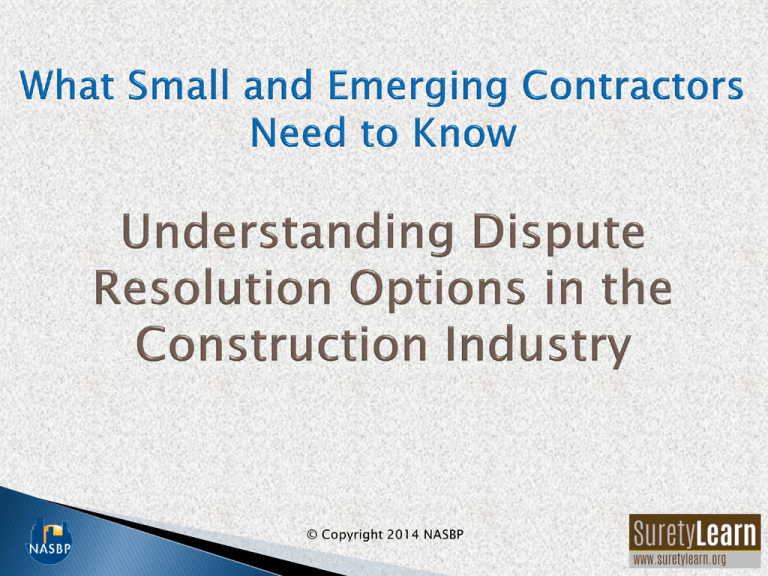
• • • • • Disputes and claims are common in the construction industry. There are a number of methods to resolve such disputes. Dispute resolution can be costly in terms of time, emotional energy, business relationships, and finances. Therefore, it is critical to the health of your construction firm that you understand dispute resolution options. This presentation will focus on the four most common methods of dispute resolution in the construction industry: litigation, negotiation, mediation, and arbitration. 2 • The best time to select dispute resolution methods is during contract formation. • Sometimes the dispute resolution procedure is developed and agreed to later by the parties. • Standard form construction contracts have dispute resolution provisions, some of which allow for election of methods (by checking a box). • Sometimes contracts provide for several steps the parties must take before the final dispute resolution method (typically, litigation or arbitration) is commenced. • These provisions can be modified by revising the contracts before signing. • Always review and, if necessary, negotiate the dispute resolution provision in contracts before signing. 3 • When acting as a subcontractor or supplier, you may be bound to a dispute resolution method in the prime contract; therefore, always review the prime contract provisions. • Your bond producer can help you spot dispute resolution issues in your contracts. • Your construction attorney can advise you on and negotiate the provisions in your contracts. • When agreeing to a dispute resolution process, whether in the contract negotiation or after the dispute has arisen, you must weigh the benefits and limitations of each available dispute resolution method. • All alternative methods of dispute resolution are voluntary and must be agreed to by all parties. • They are, therefore, often more successful methods of resolving a dispute in a timely and cost-effective manner. 4 • • Litigation—traditional method of formally resolving a dispute through the court system, beginning with the filing of a lawsuit in a state or federal court and continuing the process until the court enters judgment in favor of one party (or the parties withdraw the lawsuit). Alternative Dispute Resolution (ADR)—any method of resolving disputes other than by litigation: Negotiation Mediation Arbitration 5 • • • • • • • • Some parties insist upon their “day in court.” Parties are represented by attorneys. Common for construction cases to involve multiple parties Parties lose autonomy to shape their resolution. Virtually unlimited discovery rights (document requests, interrogatories, requests for admission, depositions, expert reports and depositions) and robust motions practice Outcome is difficult to predict. Judges and jurors, who often do not have expertise in the construction industry, shape the decision. Legal remedies are available but less creativity involved in resolution than with ADR. 6 • • • • • • • Very expensive in terms of costs, especially costs associated with exchanging information (in this era of emails and electronic documents) Requires lots of time from both attorneys and project personnel and representative principals of the firm. Usually highly adversarial Business relationships are seldom salvaged. Even after a lawsuit is filed, parties can try to resolve the dispute using ADR methods, any time before a judgment is entered by the court. Broad rights of appeal from an adverse judgment. Litigation documents are made public. 7 • • • Negotiation Mediation Arbitration These ADR methods are listed generally in order of increasing cost to reach resolution, formality of the process, degree of hostility between the parties, and extent that a third party imposes a decision on the parties. Standard form industry contracts often require the parties to attempt mediation before resorting to either litigation or arbitration. 8 • • • • • • • • Parties try to negotiate resolution of the dispute. Least adversarial method of dispute resolution. Focus is on problem solving and reaching a satisfactory agreement. Negotiations are usually unassisted by a third party. Parties typically are not represented by counsel, as presence of attorneys can raise the level of adversarial behavior. Very low cost and typically not time-consuming Voluntary process, with the parties controlling the outcome Resolution is by voluntary agreement of the parties. 9 • • • • • Parties are free to fashion any solution that might not be available to a court or arbitrator. Parties can often maintain a continuing business relationship during and after the negotiation. The resolution can be confidential. Successful negotiations depend on the parties understanding the issues in dispute and in approaching the negotiation with an open mind and good faith desire to resolve the issues in dispute. A party representative who has authority to settle and enter into a binding resolution should participate. 10 • • • • • • Non-binding ADR where disputing parties use a neutral third party, a mediator, to help them reach a settlement. Parties can select a mediator, who should have expertise in the construction industry. Mediator does not act as a judge but “referees” a settlement between the parties. Low cost and less time-consuming than litigation and arbitration (no discovery, motions, or depositions) Parties may select procedures for disclosure of positions and evidence. The disputing parties control the outcome and fashion their own solutions to the dispute. 11 • • • • • • • Most mediations involve a one- or two-day session, which may or may not result in settlement. The settlement agreement between the parties should be made into an enforceable, written contract. Parties often maintain a continuing business relationship during and after mediation. Resolution is usually confidential and is written into the settlement agreement. Success often occurs when parties enter the process with a good faith intention to attempt to settle the disputes. A party representative who has authority to settle and enter into a binding resolution should participate. Generally, parties should be represented by an attorney. 12 • • • • • • • Can be less expensive and time-consuming than litigation but . . . In worst case, can also be as expensive and timeconsuming as litigation Resolution occurs through the issuance of an “award” by a single arbitrator or arbitration panel (3 arbitrators). Parties can select the arbitrator(s), who should have construction expertise. Arbitrator(s) decides the outcome after a hearing, lasting one day to many weeks. More structured than negotiation and mediation Quasi-judicial in nature but more flexible than litigation. 13 • • • • • • Parties may, within limits, select certain procedures and the schedule. Discovery rights depend on the rules selected and arbitrator discretion. The “award” is final and binding; grounds to appeal the award are extremely limited (such as bias or fraud). Proceeding is usually confidential. Arbitration is highly adversarial. Parties should be represented by an attorney. 14 • • • • The ADR process may be administered by individuals who serve as mediators and arbitrators or by various organizations whose function it is to administer and manage ADR cases. The American Arbitration Association (AAA) is a wellrespected organization that provides such administrative services, including assisting in appointment of mediators and arbitrators, setting hearings, and providing users with information on dispute resolution options. AAA is named as a provider of mediation and arbitration services in construction industry standard form contracts. AAA maintains a national list of ADR neutrals with a broad range of construction and surety industry experience. 15 • • • • • • • • • • • Is the option mandatory or voluntary? What is the financial cost of the option? What is my time commitment? What is the time period to conclude? Do I have the right to select the decision-maker? What rules and procedures will be imposed on me or will I be able to select? Will I have any control over the outcome or will it be imposed on me? Is it advisable to use my construction attorney ? Is the result final and binding or appealable? How adversarial is the option: is the option likely to allow me to maintain the business relationship? Will the final resolution be confidential? 16


